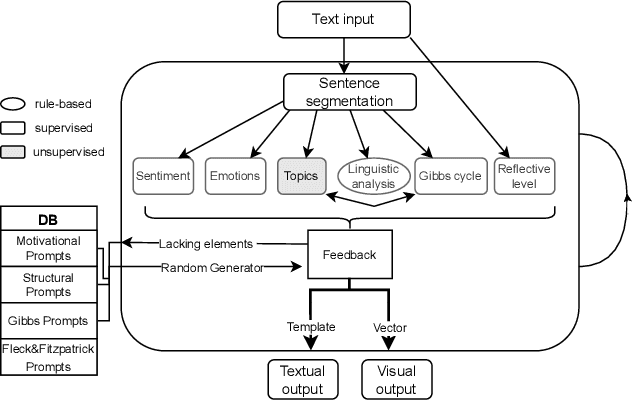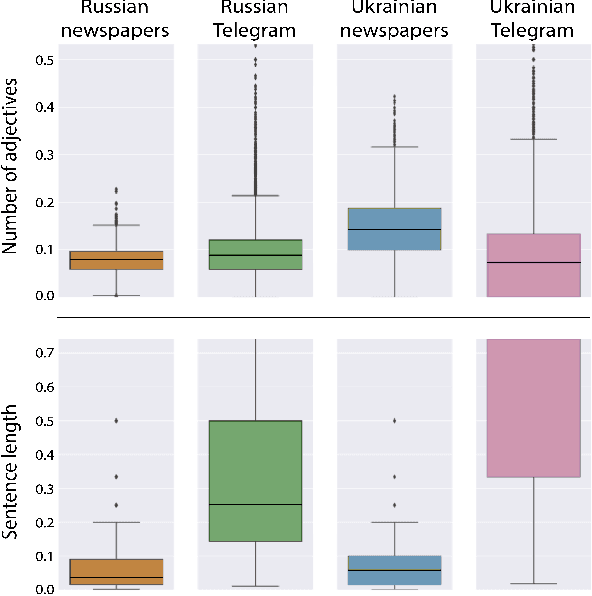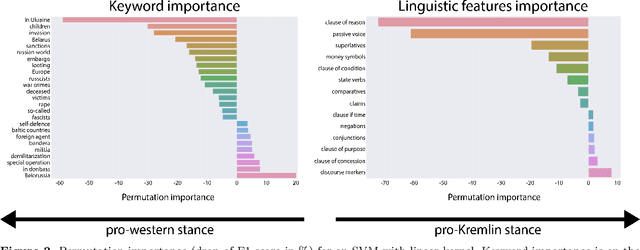Veronika Solopova
Online Density-Based Clustering for Real-Time Narrative Evolution Monitorin
Jan 28, 2026Abstract:Automated narrative intelligence systems for social media monitoring face significant scalability challenges when processing continuous data streams using traditional batch clustering algorithms. We investigate the replacement of HDBSCAN (offline clustering) with online (streaming/incremental) clustering methods in a production narrative report generation pipeline. The proposed system employs a three-stage architecture (data collection, modeling, dashboard generation) that processes thousands of multilingual social media documents daily. While HDBSCAN excels at discovering hierarchical density-based clusters and handling noise, its batch-only nature necessitates complete retraining for each time window, resulting in memory constraints, computational inefficiency, and inability to adapt to evolving narratives in real-time. This work evaluates a bunch of online clustering algorithms across dimensions of cluster quality preservation, computational efficiency, memory footprint, and integration compatibility with existing workflows. We propose evaluation criteria that balance traditional clustering metrics (Silhouette Coefficient, Davies-Bouldin Index) with narrative metrics (narrative distinctness, contingency and variance). Our methodology includes sliding-window simulations on historical datasets from Ukraine information space, enabling comparative analysis of algorithmic trade-offs in realistic operational contexts. This research addresses a critical gap between batch-oriented topic modeling frameworks and the streaming nature of social media monitoring, with implications for computational social science, crisis informatics, and narrative surveillance systems.
Order in the Evaluation Court: A Critical Analysis of NLG Evaluation Trends
Jan 12, 2026Abstract:Despite advances in Natural Language Generation (NLG), evaluation remains challenging. Although various new metrics and LLM-as-a-judge (LaaJ) methods are proposed, human judgment persists as the gold standard. To systematically review how NLG evaluation has evolved, we employ an automatic information extraction scheme to gather key information from NLG papers, focusing on different evaluation methods (metrics, LaaJ and human evaluation). With extracted metadata from 14,171 papers across four major conferences (ACL, EMNLP, NAACL, and INLG) over the past six years, we reveal several critical findings: (1) Task Divergence: While Dialogue Generation demonstrates a rapid shift toward LaaJ (>40% in 2025), Machine Translation remains locked into n-gram metrics, and Question Answering exhibits a substantial decline in the proportion of studies conducting human evaluation. (2) Metric Inertia: Despite the development of semantic metrics, general-purpose metrics (e.g., BLEU, ROUGE) continue to be widely used across tasks without empirical justification, often lacking the discriminative power to distinguish between specific quality criteria. (3) Human-LaaJ Divergence: Our association analysis challenges the assumption that LLMs act as mere proxies for humans; LaaJ and human evaluations prioritize very different signals, and explicit validation is scarce (<8% of papers comparing the two), with only moderate to low correlation. Based on these observations, we derive practical recommendations to improve the rigor of future NLG evaluation.
How desirable is alignment between LLMs and linguistically diverse human users?
Feb 18, 2025Abstract:We discuss how desirable it is that Large Language Models (LLMs) be able to adapt or align their language behavior with users who may be diverse in their language use. User diversity may come about among others due to i) age differences; ii) gender characteristics, and/or iii) multilingual experience, and associated differences in language processing and use. We consider potential consequences for usability, communication, and LLM development.
Extending Information Bottleneck Attribution to Video Sequences
Jan 28, 2025



Abstract:We introduce VIBA, a novel approach for explainable video classification by adapting Information Bottlenecks for Attribution (IBA) to video sequences. While most traditional explainability methods are designed for image models, our IBA framework addresses the need for explainability in temporal models used for video analysis. To demonstrate its effectiveness, we apply VIBA to video deepfake detection, testing it on two architectures: the Xception model for spatial features and a VGG11-based model for capturing motion dynamics through optical flow. Using a custom dataset that reflects recent deepfake generation techniques, we adapt IBA to create relevance and optical flow maps, visually highlighting manipulated regions and motion inconsistencies. Our results show that VIBA generates temporally and spatially consistent explanations, which align closely with human annotations, thus providing interpretability for video classification and particularly for deepfake detection.
Check News in One Click: NLP-Empowered Pro-Kremlin Propaganda Detection
Jan 28, 2024



Abstract:Many European citizens become targets of the Kremlin propaganda campaigns, aiming to minimise public support for Ukraine, foster a climate of mistrust and disunity, and shape elections (Meister, 2022). To address this challenge, we developed ''Check News in 1 Click'', the first NLP-empowered pro-Kremlin propaganda detection application available in 7 languages, which provides the lay user with feedback on their news, and explains manipulative linguistic features and keywords. We conducted a user study, analysed user entries and models' behaviour paired with questionnaire answers, and investigated the advantages and disadvantages of the proposed interpretative solution.
Verbreitungsmechanismen schädigender Sprache im Netz: Anatomie zweier Shitstorms
Dec 12, 2023Abstract:In this working paper, we turn our attention to two exemplary, cross-media shitstorms directed against well-known individuals from the business world. Both have in common, first, the trigger, a controversial statement by the person who thereby becomes the target of the shitstorm, and second, the identity of this target as relatively privileged: cis-male, white, successful. We examine the spread of the outrage wave across two media at a time and test the applicability of computational linguistic methods for analyzing its time course. Assuming that harmful language spreads like a virus in digital space, we are primarily interested in the events and constellations that lead to the use of harmful language, and whether and how a linguistic formation of "tribes" occurs. Our research therefore focuses, first, on the distribution of linguistic features within the overall shitstorm: are individual words or phrases increasingly used after their introduction, and through which pathways they spread. Second, we ask whether "tribes," for example, one group of supporters and one of opponents of the target, have a distinguished linguistic form. Our hypothesis is that supporters remain equally active over time, while the dynamic "ripple" effect of the shitstorm is based on the varying participation of opponents.
PapagAI:Automated Feedback for Reflective Essays
Jul 10, 2023



Abstract:Written reflective practice is a regular exercise pre-service teachers perform during their higher education. Usually, their lecturers are expected to provide individual feedback, which can be a challenging task to perform on a regular basis. In this paper, we present the first open-source automated feedback tool based on didactic theory and implemented as a hybrid AI system. We describe the components and discuss the advantages and disadvantages of our system compared to the state-of-art generative large language models. The main objective of our work is to enable better learning outcomes for students and to complement the teaching activities of lecturers.
Automated multilingual detection of Pro-Kremlin propaganda in newspapers and Telegram posts
Jan 25, 2023



Abstract:The full-scale conflict between the Russian Federation and Ukraine generated an unprecedented amount of news articles and social media data reflecting opposing ideologies and narratives. These polarized campaigns have led to mutual accusations of misinformation and fake news, shaping an atmosphere of confusion and mistrust for readers worldwide. This study analyses how the media affected and mirrored public opinion during the first month of the war using news articles and Telegram news channels in Ukrainian, Russian, Romanian and English. We propose and compare two methods of multilingual automated pro-Kremlin propaganda identification, based on Transformers and linguistic features. We analyse the advantages and disadvantages of both methods, their adaptability to new genres and languages, and ethical considerations of their usage for content moderation. With this work, we aim to lay the foundation for further development of moderation tools tailored to the current conflict.
 Add to Chrome
Add to Chrome Add to Firefox
Add to Firefox Add to Edge
Add to Edge